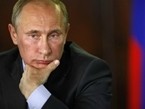
To most observers, U.S. and European economic sanctions have had minimal success in discouraging Russia from covertly interfering in the Ukraine. But sanctions have exposed Russia’s dependence on America’s Visa and MasterCard for processing about 56% of all transactions in Russia’s $2.3 trillion economy.
America in an instant can economically bring Russia to its knees by imposing sanctions to freeze debit and credit transactions. Although Russia is looking to reduce this catastrophic vulnerability, they will have no viable options over the next two years. But for the U.S., use of economic sanctions to achieve political goals will also hurt U.S. businesses.
The Soviet Union as a communist nation was opposed to credit cards as a sign of decadence and consumerism. After the fall of the USSR in 1993, all the Russian banks were either grossly insolvent or distrusted by the people. The nation’s new leaders turned to Western-backed debit cards to replace payroll checks and savings.
Today, around 59% of all transactions in Russia are done through debit and credit cards. Visa and MasterCard control 95% of this market. For a nation of 105.5 million adults, there are approximately 192 million debit cards and 30 million credit cards in circulation in Russia. There are 11 other indigenous credit processing platforms via its commercial banks that hold 5% of credit transactions. Visa controls 60% and MasterCard controls 35% of debit and credit transactions.
Visa and currently MasterCard hold 87% of the world’s processing market. The only reason that China’s UnionPay holds a 7.9% share is due to government fiat. Other significant market share processors include American Express at 3.7%, Japan’s JCB International at 1.1%, and Dinner Club at .1%. Visa and MasterCard together processed about 20% of all the world’s financial transactions in 2013, including cash, check, bank wires, and card processing.
In the month before annexing the Crimea, the U.S. Federal Reserve reported deposits by Russians in US banks suddenly plunged by 61% from $21.6 billion to $8.4 billion by the end of March. It is assumed that virtually all Russian deposits were withdrawn by the time the first sanctions were implemented in April.
The U.S. and European sanctioned Bank Rossiya, SMP Bank, and Invest Capital Bank seemed ineffective; because the banks have little business outside of Russia. But sanctions barring Visa and MasterCard processing caused instant chaos for these small banks. Processing sanctions on large Russian banks such as Sberbank, VTB, and Gazprombank that hold 25% market share would have sent the Russian economy into panic.
To try to mitigate this vulnerability, in April the Russian State Duma legislature passed a law requiring Visa and MasterCard by July 1st to provide security deposits at Russia’s Central Bank equal to 2 days of processing. At the current rate of about $1.9 billion per day in processed dollars, Visa and MasterCard will be required to post $3.8 billion as a guarantee that the Western governments cannot overnight drain the Russian economy of liquidity through the processing firms. But $3.8 billion is 5 times the revenue of Russian transactions of Visa and MasterCard combined.
Stratfor Global Intelligence reported that Visa’s CEO Charles Scharf said that Russia’s demands “just go beyond what we’d be willing to do” as a threat to leave the country. On May 22-23, the heads of the Russian divisions for Visa and MasterCard met with Finance Minister Anton Siluanov and First Deputy Prime Minister Igor Shuvalov to discuss the issue. Following the meeting, MasterCard said “it would remain in Russia despite the upcoming changes. Visa, however, said it is still looking for a compromise before the July 1 deadline, indicating that it may curb or shut down its Russia operations, although it remains dedicated to continuing talks.”
China reportedly offered to allow UnionPay to expand into Russia to offset Visa and MasterCard. For China, this would offer a tremendous business opportunity and allow greater integration between the two countries. Although this would resolve the risk of Western sanctions, Russia would then be at risk from any future Chinese interference.
The Russian Duma also adopted a law establishing the “National Payment Card System” through the Central Bank of Russia to expand its domestic credit processing capabilities. According to the Russian Legal Information Agency, Pavel Vrublevsky, the co-founder and owner of ChronoPay – one of Russia’s largest e-payment providers – was released on parole last week when he agreed to run the system. Last summer, Vrublevsky was convicted of masterminding a denial of service computer attack (DDoS) attack on Aeroflot’s website in 2010 and sentenced to 2.5 years in prison.
Russian President Vladimir Putin said he is negotiating with the Japan Credit Bureau to use their technology. JCB dominates the nation’s credit system. As a public policy Japan has sought through predatory pricing to keep Visa and MasterCard from dominating transaction activity.
Consolidating control over all credit processing would lessen Russia’s vulnerability to the Western sanctions, but it would also allow the government to track transactions in the country and help with tax evasion that is a major problem for Russia. The National Payment Card System could expand into a regional processing center that would be economically integrated into the newly formed Eurasian Economic Union.
The United States and Europe can instantly crush the Russian economy by implementing sanctions barring Visa and MasterCard from processing debit and credit cards in Russia. But American technology companies like IBM and Cisco are already losing huge sales as retaliation after participating with U.S. surveillance operations. In the long term, threatening to cut off transaction processing may have stiff economic repercussions for America.
The author welcomes feedback and will respond to comments by readers.

COMMENTS
Please let us know if you're having issues with commenting.